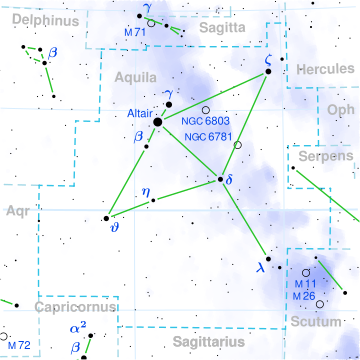Nu Aquilae, Latinized from ν Aquilae, is the Bayer designation for a double star in the constellation of Aquila that lies close to the celestial equator. It has an apparent visual magnitude of 4.72 and so is visible to the naked eye. Based upon an annual parallax shift of only 0.8752 mas (with a 10% margin of error), it is believed to lie approximately 3,700 light-years (1,100 parsecs) from Earth.[1] The variable star NU Aquilae has a similar-looking designation but is a separate and unrelated object.
| Observation data Epoch J2000 Equinox J2000 | |
|---|---|
| Constellation | Aquila |
| Right ascension | 19h 26m 31.08926s[1] |
| Declination | +00° 20′ 18.8549″[1] |
| Apparent magnitude (V) | 4.72[2] + 9.6[3] |
| Characteristics | |
| Spectral type | F3 Ib[4] + A1 IV/V[3] |
| U−B color index | +0.60[2] |
| B−V color index | +0.59[2] |
| Astrometry | |
| Radial velocity (Rv) | –2.30[5] km/s |
| Proper motion (μ) | RA: −0.562[1] mas/yr Dec.: −2.294[1] mas/yr |
| Parallax (π) | 0.8752 ± 0.0869 mas[1] |
| Distance | 3,700 ± 400 ly (1,100 ± 100 pc) |
| Absolute magnitude (MV) | −5.58[6] |
| Details | |
| Mass | 12.5[4] M☉ |
| Radius | 71.20+14.45 −10.23[7] R☉ |
| Luminosity | 7,645±1,464[7] L☉ |
| Surface gravity (log g) | 1.43[4] cgs |
| Temperature | 6,396+516 −564[7] K |
| Metallicity [Fe/H] | −0.03[8] dex |
| Rotational velocity (v sin i) | 13[9] km/s |
| Age | 15[4] Myr |
| Other designations | |
| ν Aql A: 32 Aql, BD+00° 4206, HD 182835, HIP 95585, HR 7387, SAO 124628 | |
| ν Aql B: BD+00° 4204, SAO 124623 | |
| Database references | |
| SIMBAD | data |
The spectrum of ν Aql A matches a stellar classification of F3, with the luminosity class of Ib indicating this is a supergiant. This is a massive star, with approximately 12.5 times the mass of the sun,[4] and it spans ~71 times the Sun's girth.[7] It is only 15[4] million years old and is radiating around 7,600 times the luminosity of the Sun.[7] The outer atmosphere has an effective temperature of 6,700 K and it has the yellow-white hue of an F-type star.[10]
ν Aql B is a ninth magnitude star 201 arc-seconds distant.[11] Little is known about it except an approximate spectral classification.[3]
References
External links
Wikiwand in your browser!
Seamless Wikipedia browsing. On steroids.
Every time you click a link to Wikipedia, Wiktionary or Wikiquote in your browser's search results, it will show the modern Wikiwand interface.
Wikiwand extension is a five stars, simple, with minimum permission required to keep your browsing private, safe and transparent.

